Films with theme "Films about Jews and Judaism", sorted by revenue
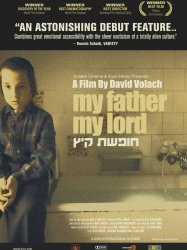
My Father My Lord (2007)
, 1h12Directed by David Volach
Origin Israel
Genres Drama
Themes Films about religion, Films about Jews and Judaism
Actors Assi Dayan (אסי דיין)
Rabbi Avraham and his wife Esther have one son, Menachem, whose birth they regard as miraculous. Menachem's curiosity about the world is repeatedly stymied by his father, who in one instance forces him to rip up an "idolatrous" picture. Foreshadowed by an instance of Shiluach haken a trip to the Dead Sea, the eponymous "summer vacation.

The Gift to Stalin (2008)
, 1h37Genres Drama
Themes Films about religion, Films about Jews and Judaism
Actors Yekaterina Rednikova, Sergueï Iourievitch Iourski
Nous sommes en 1949 au Kazakhstan alors que l'URSS s'apprête à fêter les 70 ans de Joseph Staline. Ce qui n'empêche pas la répression et les déportations d'opposants de continuer. Dans un train de déportés vers le Kazakhstan meurt un vieil homme juif. Son petit-fils Sacha s'échappe du train aux côtés de sa dépouille, dissimulé parmi les cadavres. Il est recueilli par Kasym, un vieux garde-voie kazakh qui, pour le dissimuler aux yeux des autorités, le renomme Sabyr. Dans le village le long de la voie ferrée vivent en paix des gens d'origines très différentes. Mais le pressentiment d'une tragédie imminente est bien là.

Budrus (2010)
, 1h10Directed by Julia Bacha
Origin USA
Genres Documentary
Themes Films set in Africa, Films about religion, Documentary films about law, Documentary films about war, Documentary films about historical events, Documentaire sur une personnalité, Documentary films about politics, Documentary films about religion, Political films, Films about Jews and Judaism
Jordana Horn in The Jewish Daily Forward states that: Budrus [is] a documentary by Julia Bacha that examines one West Bank town’s reaction to Israel’s construction of the security barrier. The town, with a population of 1,500, was set to be divided and encircled by the barrier, losing 300 acres of land and 3,000 olive trees. These trees were not only critical for economic survival but also sacred to the town’s intergenerational history. The film tells the story of Ayed Morrar, a Palestinian whose work for Fatah had led to five detentions in Israeli jails, but whose momentous strategic decision that the barrier would be best opposed by nonviolent resistance had far-reaching ramifications.

He's My Girl (2009)
, 1h30Directed by Jean-Jacques Zilbermann
Origin France
Genres Comedy, Romance
Themes Films about religion, Films about sexuality, LGBT-related films, Films about Jews and Judaism, LGBT-related film
Actors Antoine de Caunes, Mehdi Dehbi, Judith Magre, Elsa Zylberstein, Catherine Hiegel, Micha Lescot
Simon Eskenazy, un grand interprète de musique traditionnelle juive, voit tour à tour revenir sa mère envahissante, son ex-femme et son fils de 10 ans qu'il n'a jamais vu. Parmi tout ça, il se démène comme il peut dans ses relations sentimentales entre un professeur de philo et Naïm, un jeune travesti musulman qui va changer sa vie...

Man Is a Woman (1998)
, 1h40Directed by Régis Musset, Jean-Jacques Zilbermann
Origin France
Genres Drama, Comedy, Comedy-drama, Musical, Romance
Themes Films about religion, Films about sexuality, LGBT-related films, Films about Jews and Judaism, LGBT-related films, LGBT-related film
Actors Antoine de Caunes, Elsa Zylberstein, Michel Aumont, Gad Elmaleh, Maurice Bénichou, Judith Magre
Simon Eskanazy is a thirty-year-old gay musician. Born into a Jewish family, he took great pains to accept his homosexuality, and to get his family (including his mother and his uncle, Salomon) to do the same. The latter, Uncle Salomon is a wealthy banker who offered him a deal: he'll give him 10 million francs and will bequeath his mansion to Simon only if Simon agrees to marry a woman. First reluctant, he met Rosalie Baumann, a Jewish singer known for singing in Yiddish, she is very observant, and her parents live in the United States. Little by little, while getting to know her, Simon falls in love with her.
 , 1h35
, 1h35Directed by John Kent Harrison
Origin USA
Genres Drama, War, Biography
Themes Films about religion, Political films, Films about Jews and Judaism
Actors Anna Paquin, Marcia Gay Harden, Goran Višnjić, Nathaniel Parker, Steve Speirs, Paul Freeman
Irena Sendler (née Krzyżanowska) is a Catholic social worker who has sympathized with the Jews since her childhood, when her physician father died of typhus contracted while treating poor Jewish patients. When she initially proposes saving Jewish children from the Warsaw Ghetto, her idea is met with skepticism by fellow workers, her parish priest, and even her own mother Janina.
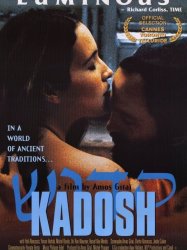
Kadosh (1999)
, 1h56Directed by Amos Gitaï
Origin France
Genres Drama, Comedy-drama, Romance
Themes Films about religion, Films about Jews and Judaism
Actors Yaël Abecassis, Lea Koenig, Rivka Michaeli
Kadosh is a bleak drama about the narrow Israeli secular perspective on the status of women in Haredi society. In the opening scene, Meir (Yoram Hattab), a caricature of a young Talmudic scholar, thanks God in his morning prayers for not being born a woman. At first, the marriage of Meir and his wife, Rivka (Yael Abecassis), appears tender and idyllic, but as the day progresses it becomes clear that Meir is obsessed with the fact that he is childless after ten years of marriage. Rivka's younger sister, Malka, marries Yosef in a match arranged by their parents, but loves Yaakov, a rock singer, who has abandoned the religious community.
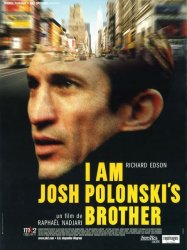
I am Josh Polonski's Brother (2001)
, 1h20Directed by Raphaël Nadjari
Origin France
Genres Drama
Themes Films about religion, Films about Jews and Judaism
Actors Richard Edson
The Polonski brothers, Abe, Ben and Josh, work together in their family's fabric store on the lower east side of Manhattan. Like any other Jewish family they go to their mother's to spend the Sabbath together. But one day, Josh is shot to death in the middle of the street in front of Abe's eyes.. For Ben the tragic situation has an explanation - the nightlife of Josh - but Abe wants to understand what happened. Following the path of his brother, he walks in the same foosteps, finding more and more of himself.

Policeman (2011)
, 1h45Directed by Nadav Lapid
Origin Israel
Genres Drama, Crime
Themes Films about religion, Films about Jews and Judaism
Actors Menashe Noy, Michael Moshonov, Keren Mor
Klein plays Yaron the head of a counter terrorist organization. There is a hostage drama near the end of the film. Yaron's wife is pregnant. The film explores Yaron's difficulties in compartmentalizing his professional and domestic lives.
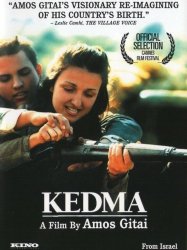
Kedma (2002)
, 1h40Directed by Amos Gitaï
Origin Israel
Genres Drama, War
Themes Films about religion, Films about Jews and Judaism
Actors Moni Moshonov, Juliano Mer-Khamis, Sendi Bar, Yaël Abecassis
The film is a historical tragedy set during the opening stages of Israel's 1948 War of Independence. The film follows the fate of a group of refugees from the Holocaust who are illegally brought to Israel by the Palmach. When they arrive, they are chased by British soldiers. Once they escape, they are immediately drafted into the war, and take part in a grueling battle against Arab irregulars. The film centers on two long monologues, one by an Arab peasant who pledges to oppose the Jews forever; and one by an emotionally demolished refugee who laments the seemingly endless suffering of his people. Gitai intended the film to be a more realistic answer to the romanticized depiction of the war in Otto Preminger's Exodus. The final shot of Kedma is identical to the final shot of Preminger's film.
 , 52minutes
, 52minutesOrigin German
Genres Documentary
Themes Environmental films, Films about religion, Documentary films about environmental issues, Documentary films about war, Documentary films about historical events, Documentary films about nuclear technology, Documentary films about religion, Documentary films about technology, Films about Jews and Judaism
Israël et le tabou de la bombe est un film documentaire allemand réalisé en 2012. Il raconte l'histoire du programme nucléaire israélien.

God's Neighbors (2012)
, 1h34Origin Israel
Genres Drama
Themes Films about religion, Films about Jews and Judaism
Dans la ville de Bat Yam, près de Tel Aviv, Avi Assaf, Kobi et Yaniv, trois miliciens juifs ultra-orthodoxes, font respecter violemment les préceptes de la religion juive, jusqu'à ce qu'Avi tombe amoureux de Miri (Zisman-Cohen), une nouvelle venue dans le quartier...
 , 1h25
, 1h25Directed by Yolande Zauberman
Origin France
Genres Documentary
Themes Films set in Africa, Films about religion, Films about sexuality, Documentary films about law, Documentary films about war, Documentary films about historical events, Documentaire sur une personnalité, Documentary films about politics, Documentary films about religion, Political films, Films about Jews and Judaism
Actors Juliano Mer-Khamis
Dans les bars de Tel Aviv, la nuit, la réalisatrice demande à des jeunes Juifs s'ils auraient des relations sexuelles avec des Arabes, et à des jeunes Arabes s'ils feraient l'amour avec des Juifs. Chacun donne son avis, avec plus ou moins d'explications, sur le symbole que cela peut représenter pour eux (beaucoup l'ont déjà fait) ou au contraire leur refus. Des jeunes issus de familles mixtes (un parent juif, l'autre arabe) sont également interviewés. Le film recueille aussi les témoignages du journaliste Gideon Levy et de l'acteur Juliano Mer-Khamis, de mère juive et de père arabe, assassiné en 2011 par des Palestiniens à Jénine.
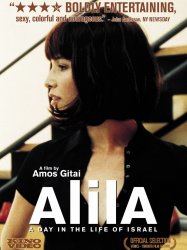
Alila (2003)
, 2h2Directed by Amos Gitaï
Origin Israel
Genres Drama, Comedy
Themes Films about religion, Films about Jews and Judaism
Actors Yaël Abecassis, Hana Laszlo, Ronit Elkabetz, Amos Lavi
Instead of written credits at the beginning of the film, Gitai reads out the credits, introduces himself to the viewer, and explains that Alila is based on the novel Returning Lost Love. The rest of the movie is made up of forty individual single shot scenes depicting the lives of several Israelis. The character's lives overlap and collide. Gabi, a bobbed haired sexpot, and her lover Hezi—who's older, balding and married—rent a room to have an affair, while Ezra, a pot bellied divorcee, supervises an illegal construction site next door. All this racket drives Schwartz, a Holocaust survivor, to a mental breakdown. Other characters include illegal immigrants, a teenage boy who's afraid to serve in the army, and a corrupt police officer. In each scene the camera moves through walls, over desks, and around rooms in order to keep focused on the character it's following, in moments of drama as well as in moments of mudane daily activity.
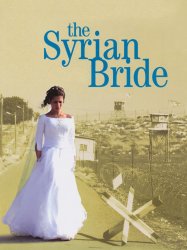
The Syrian Bride (2004)
, 1h37Directed by Eran Riklis
Origin Israel
Genres Drama, Comedy, Comedy-drama
Themes Films set in Africa, Films about families, Films about religion, Political films, Films about Jews and Judaism
Actors Hiam Abbass, Makram J. Khoury, Clara Khoury, Ashraf Barhom, Julie-Anne Roth, Melanie Peres
Set in the summer of 2000, Mona (Clara Khoury), a young Druze woman living at Majdal Shams in the Golan Heights, is about to marry a successful Syrian actor. Following the hostilities between Israel and Syria there is now the demilitarised UNDOF zone between occupied Golan and Syria observed by United Nations staff. Crossing of the zone is extremely rare as it is only granted by both sides under special circumstances. It has taken 6 months to obtain permission from the Israeli administration for Mona to leave the Golan. When Mona crosses she will not be able to return to her family on the Golan even to visit. Mona is a bit hesitant also because she doesn't know her husband-to-be.
 Connection
Connection